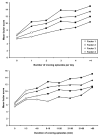Reliability and validity of a short form of the Marijuana Craving Questionnaire
- PMID: 19217724
- PMCID: PMC2694410
- DOI: 10.1016/j.drugalcdep.2008.12.010
Reliability and validity of a short form of the Marijuana Craving Questionnaire
Abstract
Background: The Marijuana Craving Questionnaire (MCQ) is a valid and reliable, 47-item self-report instrument that assesses marijuana craving along four dimensions: compulsivity, emotionality, expectancy, and purposefulness. For use in research and clinical settings, we constructed a 12-item version of the MCQ by selecting three items from each of the four factors that exhibited the greatest within-factor internal consistency (Cronbach's alpha coefficient).
Methods: Adult marijuana users (n=490), who had made at least one serious attempt to quit marijuana use but were not seeking treatment, completed the MCQ-Short Form (MCQ-SF) in a single session.
Results: Confirmatory factor analysis of the MCQ-SF indicated good fit with the 4-factor MCQ model, and the coefficient of congruence indicated moderate similarity in factor patterns and loadings between the MCQ and MCQ-SF. Homogeneity (unidimensionality and internal consistency) of MCQ-SF factors was also consistent with reliability values obtained in the initial validation of the MCQ.
Conclusions: Findings of psychometric fidelity indicate that the MCQ-SF is a reliable and valid measure of the same multidimensional aspects of marijuana craving as the MCQ in marijuana users not seeking treatment.
Figures

References
-
- American Psychiatric Association. Diagnostic and Statistical Manual of Mental Disorders-Fourth Edition-Text Revision. American Psychiatric Association; Washington, DC: 2000.
-
- Browne MW, Cudeck R. Alternative ways of assessing model fit. In: Bollen KA, Long JS, editors. Testing Structural Equation Models. Sage Press; Newbury Park, CA: 1993. pp. 136–161.
-
- Browne MW, Cudeck R, Tateneni K, Mels G. CEFA: Comprehensive Exploratory Factor Analysis, Version 2.00 [Computer software and manual] 2004. [January 16, 2009]. Retrieved from http://faculty.psy.ohio-state.edu/browne/programs.htm.
-
- Budney AJ, Hughes JR, Moore BA, Vandrey R. Review of the validity and significance of cannabis withdrawal syndrome. Am J Psychiatry. 2004;161:1967–1977. - PubMed
-
- Budney AJ, Novy PL, Hughes JR. Marijuana withdrawal among adults seeking treatment for marijuana dependence. Addiction. 1999;94:1311–1321. - PubMed
Publication types
MeSH terms
Grants and funding
LinkOut - more resources
Full Text Sources
Medical

